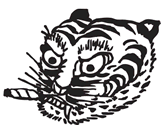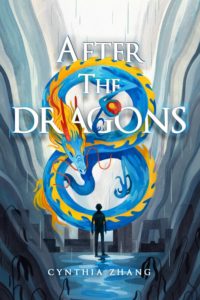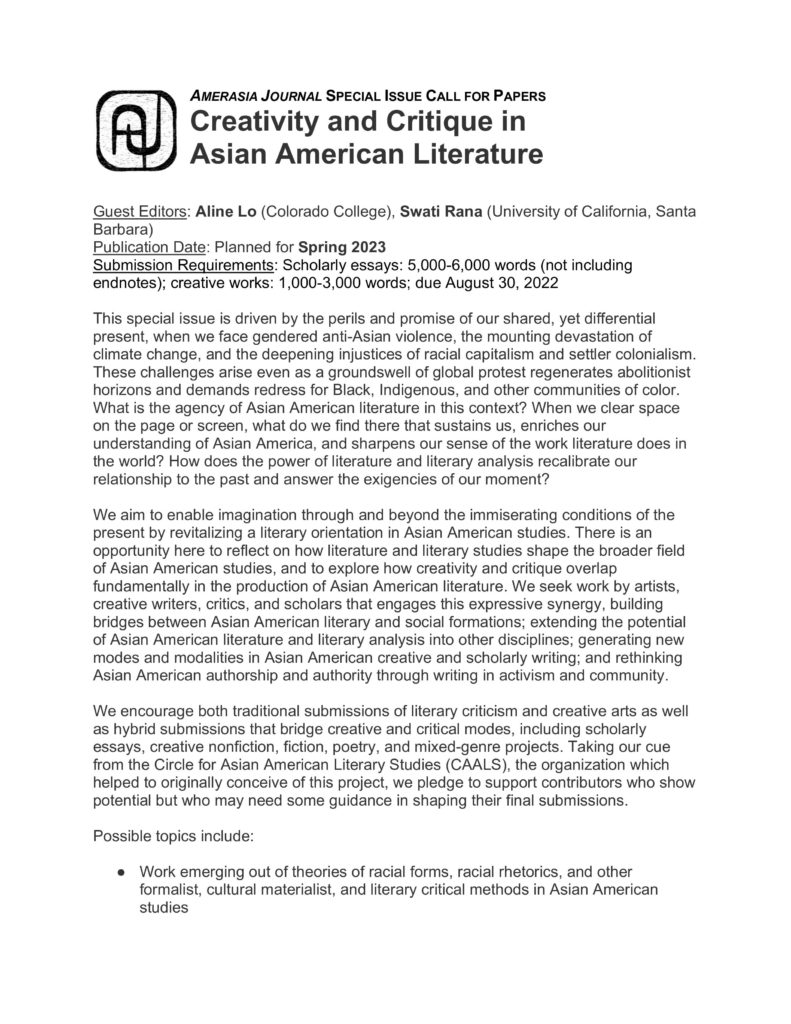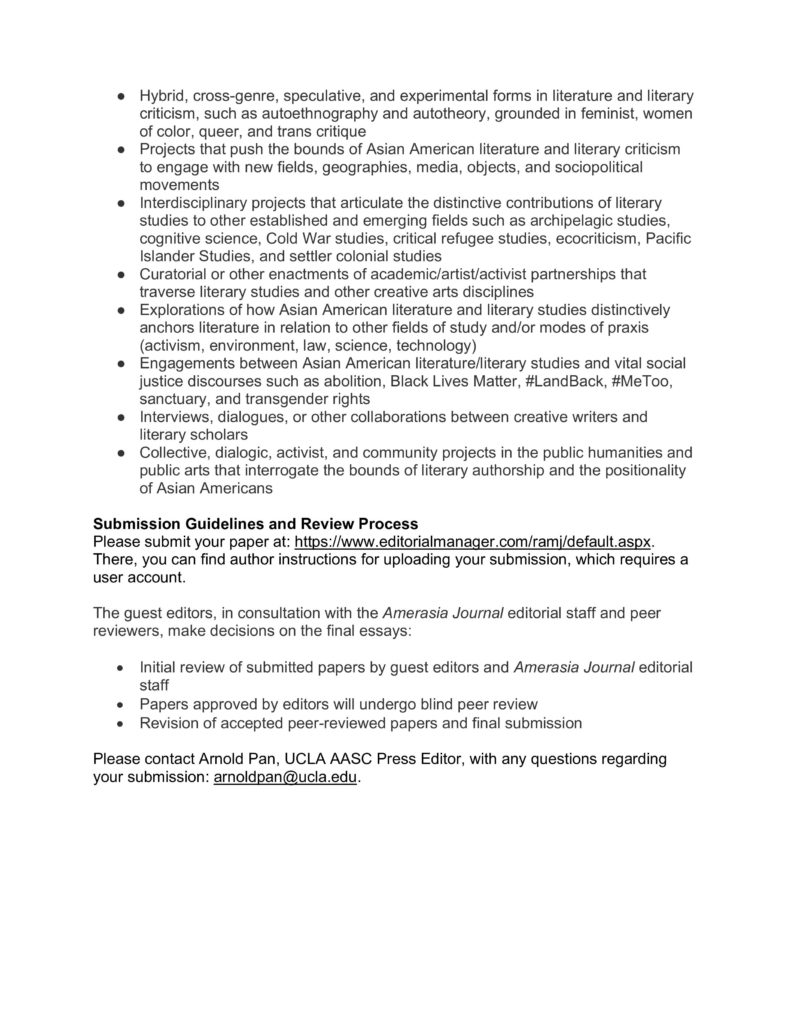Welcome back to THROUGHLINES, Kaya Press’s newsletter that bridges the gap between contemporary Asian Pacific literature and Asian American Studies. In our fourth issue, Floyd Cheung shares his syllabus on Asian American literature. Our running inventory grows with its fourth installment, highlighting recent publications by API diasporic authors. Cynthia Zhang also offers insights on how her novel, After the Dragon, can be read in classrooms for the second installment of our author interview series. And we’re highlighting a call for papers from the Amerasia Journal for their spring 2023 issue.
If you have questions or comments for THROUGHLINES, we invite you to email us at neela@kaya.com
Call for Content!
Kaya wouldn’t be where we are today without our authors, readers, and other wonderful supporters. That’s why we’re asking for your help as we continue developing Throughlines and our teaching guides; Kaya swag—stickers, t-shirts, books—will be given for any contribution and/or feedback!
For Throughlines, we’re currently looking for capsule reviews, mini-essays on your experience teaching API titles, and any other ideas through our Submittable form. Be sure to look at our past issues to see what content we enjoy featuring. The recommended length for finished submissions is between 300-500 words, with a maximum of 600 words. Files must be sent in a Word document or as a PDF.
For our teaching guides, we’re currently looking for feedback to help improve our bank of classroom resources. You can find a list of our available teaching guides here and submit your feedback through this Google form.
Syllabus: Asian American Literature
Floyd Cheung, Smith College
Floyd Cheung is a professor of English language and literature and American studies and the founding chair of the Five College Asian/Pacific/American Studies Certificate Program. His scholarship focuses on the interpretation and recovery of early Asian American texts, and he has published several articles about and edited multiple volumes by forgotten and lesser-known authors. As vice president of the Office for Equity and Inclusion, Cheung leads Smith College’s initiatives to improve equity and inclusion for all students, staff and faculty.
COURSE DESCRIPTION
Although we sometimes think only of modern-day authors like Amy Tan or Jhumpa Lahiri when we think of Asian American literature, in fact Asian Americans have been writing and publishing in English since at least 1887. In this course, we read selected Asian American poetry, novels, short stories, plays and films produced from the late 19th century until the present. We consider how works engage with issues that have always concerned Asian Americans, like identity development and racism. Also, we pay attention to how works speak to concerns specific to their period, such as the exclusion acts of the 1880s, the proletarian movement of the 1930s, the decolonization of South Asian and Southeast Asian countries since the 1940s, and the increasing size and diversity of the Asian American population in the late 20th century. At all times, we attend closely to matters of language and form.
| Introduction |
Poem: “For Us” (Bao Phi)
|
| Scrutiny/Mediation: Positioning Multiracials and Transnational Adoptees of Asian Descent |
Novel: My Year of Meats (Ozeki) |
| Sell Out/Subversion: Responding to Stereotypes |
Excerpts: Intro to Charlie Chan is Dead (Jessica Hagedorn)
Intro to The Big Aiiieeeee!: An Anthology of Chinese American and Japanese American Literature (Chan, et. al) Music: “Give Me a Chance” (Beau Sia) “NYC Bitche$” (Awkwafina) Play: M. Butterfly (Hwang) Comic: Ms. Marvel: No Normal (issues 1-5) |
| War/Memory: Imagining Political and Personal Consequences |
Newspaper: “How to Tell Our Friends from the Japs” (Time)
Short story: “Wilshire Bus” (Yamamoto) “Black-Eyed Women” (Nguyen) “Suh-top!” (thúy) Poems: Selections from From Lake Minidoka to Lake Mendota and Back to the Northwest Sea (Makuuchi) Book: Gruel (Tuon) |
| Un/marked: Writing “Beyond” Race? |
Poems: Selections by Sadakichi Hartmann
“Picture Bride,” “From the White Place” (Picture Brid, Song) Selections from Mental Commitment Robots (Lee) Interview: “Cathy Song: I”m a Poet Who Happens to be Asian American” (from International Examiner, Nomaguchi) Short story: “A Temporary Matter” (Lahiri) |
| A Final, Contemporary, Multi-Modal Work by a Local Artist |
Book: Accomplice to Memory (Zhang)
|
A List of Recent Books from API Diasporic Writers, May-June 2022
This incomplete list is one in a series of inventories THROUGHLINES is developing as an informal resource for students, researchers and writers to find adjacencies among established and new writers alike. For an updated list of titles, visit: http://kaya.com/throughlines/inventories/.
Poetry
Line & Light – Jeffrey Yang
Dream of the Lake – Caroline M. Mar
The Wet Hex – Sun Yung Shin
SANDMAN – Huan He
Mouth, Sugar and Smoke – Eric Tran
Of The Florids – Shawn Hoo
Fiction
Forbidden City – Vanessa Hua
City of Orange – David Yoo
We Measure the Earth with our Bodies – Tsering Yangzom Lama
The Evening Hero – Marie Myung-Ok Lee
Counterfeit – Kirstin Chen
Nuclear Family – Joseph Han
Mother Ocean Father Nation – Nishant Batsha
Self-Portrait with Ghost – Meng Jin
Nonfiction
Translating Myself and Others – Jhumpa Lahiri
My Life: Growing Up in Asian in America – CAPE
Permission to Come Home: Reclaiming Mental Health as Asian Americans – Jenny Wang
Who Is Wellness For? – Fariha Roisin
Interview with Cynthia Zhang
In this new series of author interviews, THROUGHLINES presents writers with standard questions that reveal where their releases fit in the world of academia.
Cynthia Zhang is a Ph.D. student in Comparative Studies in Literature and Culture at the University of Southern California. Her work has appeared or is forthcoming in Kaleidotrope, On Spec, Phantom Drift, and other venues. She is a 2021 DVdebut mentee and is on the web at czscribbles.wixsite.com.
THROUGHLINES: What class would your book be perfect to be taught in and why?
Cynthia Zhang: Thematically, After the Dragons touches on Asian and Asian American identity, climate change, animal rights, and queerness, so classes that touch on any of these themes would be a good fit for the novel. As someone who’s planning to write a thesis on speculative fiction, I’d also be pleased if the novel made its way into any classes on SF, especially if the course touches on SF from marginalized writers.
THROUGHLINES: What themes in your book make it a good fit for Ethnic Studies, English, or other literature-based courses?
Zhang: In terms of plot, After the Dragons is pretty simple: two young men meet in Beijing and bond over shared concern for the city’s stray dragons, becoming friends and eventually something more. If anyone’s hoping for battles between good and evil or overthrow of corrupt governments, then I’m afraid this might not be the book for them. This is very much a book about ordinary people, the way their lives are impacted by larger forces—capitalism, climate change, homophobia—and the way they manage to survive nonetheless. Grief, climate change, the fear of whether being your true self will change how your loved ones think of you, the desire to change the world for the better against the understanding that you’re just one person with limited time and power—these are all struggles my characters face, and I think they’re also struggles that students will also relate to.
Throughlines: How can your book bring new perspectives to students?
Cynthia Zhang: What students get out of After the Dragons will necessarily depend on the specific student themself, but for US students raised with a Eurocentric school curriculum, I hope the book can offer a look at non-Western experiences. This is perhaps hoping for too much from one little book, but with anti-Asian (and particularly anti-Chinese) sentiment so rampant in this moment, I hope this book humanizes “China” as a country of actual people as opposed to rhetorical talking points. I’ve known a lot of smart, socially conscious people who live in the PRC and are well-aware of its failings (even as they’re necessarily limited in what they can do), and I want to honor their existence and their efforts.
Throughlines: Does your book feature any experiences, settings, or characters that you wish were better represented in academia?
Cynthia Zhang: Do dragons count as an answer here? Remarkably few dragons in academia, which we should really fix before the dragons find out and start getting upset about it.
Genre aside, I think academia can probably always do with more diaspora voices as well as more stories that aren’t set in the West. Along those lines, there’s also the common association of LGBT rights with Western countries, which is pretty ironic considering the West brought heteronormativity to many of the places it colonized. I hope After the Dragons can help spark conversations about different forms of queerness and how queerness itself is experienced in contexts where the typical script of coming out and living your true, authentic self isn’t always feasible or even fully desirable.
Throughlines: What other media (tv shows, books, articles, movies) do you think would pair well with your book?
Cynthia Zhang: Queer China, Comrade China (Zhi tong zhi) by Cui Zi’en is a great documentary about the development of LGBT activism in China that I think would pair well with some of the themes in After the Dragons. Similarly, Hooligan Sparrow by Nanfu Wang is a very illuminating (if harrowing) look at how activists in the PRC navigate state infrastructure.
In terms of articles/theoretical texts, I didn’t realize it while writing but I would say this novel is implicitly influenced by Lauren Berlant’s article “Slow Death” as well as Michel de Certeau’s The Practice of Everyday Life. In particular, instructors might want to talk about the way these authors examine how capitalism affects everyday life and the ways in which ordinary people nonetheless manage to navigate systems that were never built for their survival.
Someone recently described After the Dragons as atmospherically noir, so while it feels incredibly presumptuous to place my book next to these titles, I’d definitely say Wong Kar-Wai’s films were an inspiration for the tone of the novel. Happy Together would particularly fit well since it’s similarly a film about queer experience, but the bittersweet melancholy of In the Mood for Love might also work. Additionally, Han Kang’s The Vegetarian, Yoko Tawada’s Memoirs of a Polar Bear, Kirsten Bakis’s The Lives of the Monster Dogs, and Helen Macdonald’s H is for Hawk are also books I really admire for their examination of the human/animal relationship.
Throughlines: What would having your book taught mean to you?
Cynthia Zhang: After the Dragons was a labor of love, one which took several years to complete, and it’d be an incredible honor to have other people see my work as worthy of analysis and discussion. Representation isn’t all-powerful—having Simu Liu in a Marvel movie is nice, but it’s not going to solve the massive wealth disparities among Asian-Americans—but it’s still important, and if my little book can help in any way to make students seen and heard in a way they normally aren’t, then I’ll consider the novel a success.
Amerasia Journal, an interdisciplinary journal dedicated to Asian American studies, is seeking submissions for their spring 2023 issue, Creativity and Critique in Asian American Literature. For more information on how to submit, check out their website and call for papers attached below, as well as a tweet from guest editor Swati Rana. This opportunity seems especially fitting for our Throughlines audience, so be sure to submit!





Leave a Comment
We'd love to know what you think.